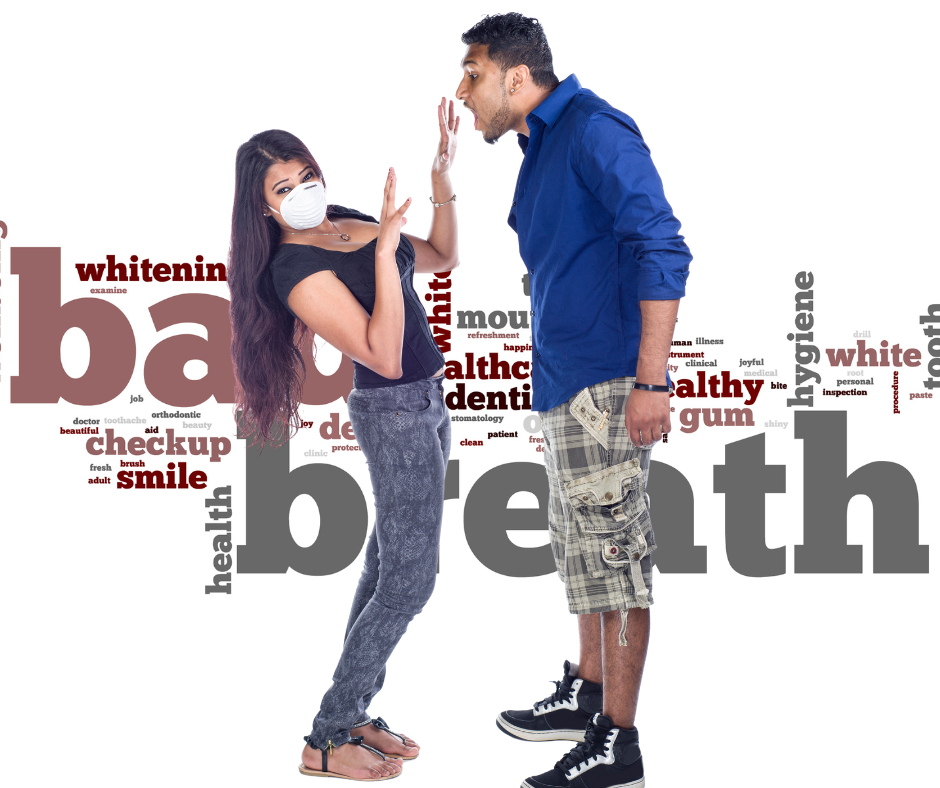Bad Breath - Now that the Masks are Off
Aug 16, 2022
By Barret Procyshyn, Pharmacist at Dauphin Clinic Pharmacy
Wearing a mask and social distancing everyday was tough. However, evidence shows its effective in preventing the spread of illnesses like COVID-19. It also has other positives, such as hiding bad breath. Now that the masks are slowly coming off, hugs and handshakes are back and people are in the same room together, treating bad breath might be a little more important. Bad Breath can be embarrassing and, in some cases, may even cause anxiety. Retail store shelves are filled with gum, mints, mouthwashes, and other products designed to fight bad breath. Keep in mind most of these products are only temporary measures (although effective) because they don't address the cause of the problem.
Halitosis is a persistent, unpleasant odor to the breath. It most often occurs in adults, though children can also be affected. Most cases of bas breath are caused by a condition in the mouth or by consuming products which cause bad breath. Chewing or smoking tobacco products is a leading cause, with food and drink also being responsible. Bacteria on the tongue, dental problems, poor oral hygiene, and lack of saliva are to blame. In some instances, bad breath can be the result of a sinus infection or a metabolic health condition, such as diabetes and even cancer.
Like most health conditions the best way to treat halitosis is to prevent it. It is important to pay close attention to your oral health. It includes avoiding certain foods and drinks, in favor of others. The breakdown of food particles in the mouth increases bacteria and cause a foul odor. Certain foods, such as onions, garlic and spices like turmeric or curry, can lead to bad breath. Interestingly after you digest these foods, they enter your bloodstream, are carried to your lungs, and can affect your breath.
Some food may improve your breath. Apples and raw veggies help to clean bacteria from the mouth. Fresh herbs contain potent oils to mask bad breath, while ginger can neutralize bad breath. Foods that help neutralize the mouth's PH like lettuce and spinach may also be worth a plate. For beverages try trading coffee for green tea as the polyphenols work to kill any bad bacteria in the mouth.
Saliva works as a cleanser in your mouth, removing particles causing bad odors. Dry mouth can contribute to bad breath because production of saliva is decreased. Dry mouth naturally occurs during sleep, leading to "morning breath," and it worsens if you sleep with your mouth open. Some medications and chronic illnesses can lead to chronic dry mouth, worsening the breath. Drinking plenty of water and using products to help moisten the mouth, may help with better breath. Sprays, gels, toothpastes and even lozenges are available at your clinic pharmacy.
Alcohol on your breath is difficult to hide (just ask a police officer or the mom of a teenager) for a few reasons. In addition to ethanol having a potent odor it is a diuretic, which causes water loss, therefore drying out your mouth. Without saliva to wash anything away and without its protective mechanism, the bacteria causing bad breath lingers and grows. Also, after alcohol is absorbed into the bloodstream, it exits via your lungs, which is why you can smell it hours later or even the next morning.
With halitosis you usually must treat the cause. A common cause is periodontitis or gum disease. It is a serious gum infection that damages the soft tissue and, without treatment, can destroy the bone that supports your teeth. Periodontitis can cause teeth to loosen or lead to tooth loss. Preventing it starts with proper oral hygiene because, while periodontitis is common it is largely preventable. Getting regular dental checkups can greatly improve your chances of successful treatment for periodontitis and can also reduce your chance of developing it. If you have not had a dentist visit due to the pandemic, make sure you get back on schedule. The Canadian Dental association cites there is very limited evidence to mouthwashes improving halitosis, however they can be worth a try to at least mask bad breath.
Abnormal spots in your mouth should always be investigated by a health care professional. Pus or nasal discharge is also a sign of infection and should be dealt with by your doctor or dentist. If you think your bad breath might be because of something more than a little too much garlic, see your dentist. They can help.

The information in this article is intended as a helpful guide only. It is not intended to be used as a substitute for professional advice. If you have any questions about your medications and what is right for you see your doctor, pharmacist, or other health care professional.





 DCP on Facebook
DCP on Facebook